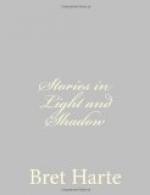Uncle Jim cleared his throat, and holding the paper close to his eyes read aloud slowly:—
“’A scene of excitement that recalled the palmy days of ’49 was witnessed last night at the Arcade Saloon. A stranger, who might have belonged to that reckless epoch, and who bore every evidence of being a successful Pike County miner out on a “spree,” appeared at one of the tables with a negro coachman bearing two heavy bags of gold. Selecting a faro-bank as his base of operations, he began to bet heavily and with apparent recklessness, until his play excited the breathless attention of every one. In a few moments he had won a sum variously estimated at from eighty to a hundred thousand dollars. A rumor went round the room that it was a concerted attempt to “break the bank” rather than the drunken freak of a Western miner, dazzled by some successful strike. To this theory the man’s careless and indifferent bearing towards his extraordinary gains lent great credence. The attempt, if such it was, however, was unsuccessful. After winning ten times in succession the luck turned, and the unfortunate “bucker” was cleared out not only of his gains, but of his original investment, which may be placed roughly at twenty thousand dollars. This extraordinary play was witnessed by a crowd of excited players, who were less impressed by even the magnitude of the stakes than the perfect sang-froid and recklessness of the player, who, it is said, at the close of the game tossed a twenty-dollar gold-piece to the banker and smilingly withdrew. The man was not recognized by any of the habitues of the place.’
“There!” said Uncle Jim, as he hurriedly slurred over the French substantive at the close, “did ye ever see such God-forsaken foolishness?”
Uncle Billy lifted his abstracted eyes from the current, still pouring its unreturning gold into the sinking sun, and said, with a deprecatory smile, “Never!”
Nor even in the days of prosperity that visited the Great Wheat Ranch of “Fall and Foster” did he ever tell his secret to his partner.
SEE YUP
I don’t suppose that his progenitors ever gave him that name, or, indeed, that it was a name at all; but it was currently believed that—as pronounced “See up”—it meant that lifting of the outer angle of the eye common to the Mongolian. On the other hand, I had been told that there was an old Chinese custom of affixing some motto or legend, or even a sentence from Confucius, as a sign above their shops, and that two or more words, which might be merely equivalent to “Virtue is its own reward,” or “Riches are deceitful,” were believed by the simple Californian miner to be the name of the occupant himself. Howbeit, “See Yup” accepted it with the smiling patience of his race, and never went by any other. If one of the tunnelmen always addressed him as “Brigadier-General,” “Judge,” or “Commodore,” it




